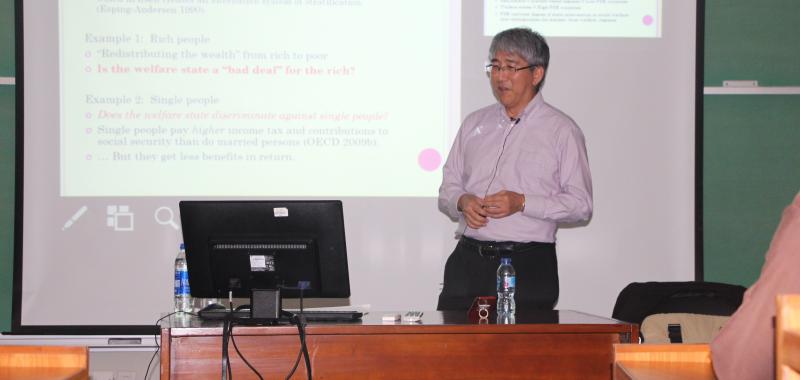
Dr Hiroshi Ono Discusses "Redistribution Happiness: How Social Policies Shape Life Satisfaction"
On Friday, 8th November, 2019, Dr Hiroshi Ono unveiled his recently published book with Kristen Schultz Lee, “Redistribution Happiness: How Social Policies Shape Life Satisfaction” at Suleman Dawood School of Business. The talk was attended by faculty members from LUMS and by the PhD Management students from SDSB.
Dr Hiroshi Ono is a Professor of Economics Sociology at Hitotsubashi ICS (Hitotsubashi University Graduate School of International Corporate Strategy) in Tokyo, Japan. Dr Ono received his BE in mechanical engineering from Waseda University, and his MA and PhD in sociology from the University of Chicago. He was later awarded Docent (equivalent to a second doctoral degree) in economics from the Stockholm School of Economics in Sweden. Dr Ono has extensive international experience, having held academic appointments in the US, Japan, and Sweden. His research integrates sociology and microeconomics to study the causes and consequences of satisfaction and inequality, with applications in the areas of gender, family, education, and labour markets. His current work examines career mobility in the Japanese labour market and the source of happiness in an international context.
The event began with a welcome address by Dr Fahd Rehman, Assistant Professor SDSB. Dr Hiroshi Ono then began with an introduction of his work on happiness, understanding the underlying contexts, and measuring it. He drew on international comparisons of data on happiness while explaining how the book offers both general and academic audiences a simple, deep, and honest answer to the timeless question: "What makes people happy?”
Dr Ono provided an overview of common explanations of happiness from other disciplines—such as economics, psychology, and political science. He went on to explain an international comparison based on his own research on what makes people happy; taking into consideration factors such as marriage, children, money, and job status. He also emphasized on how social policies and social context directly affect people's happiness in his research.
The audience enjoyed Dr Hirosho’s comprehensive — and fascinating — answers to the factors defining and influencing happiness because of how he connected an individual's experience to the broader environment of the social system and situation in which that person resides.
A few highlights from Dr Hiroshi Ono’s research are as under:
-
- Analysis of survey data from 29 countries highlighting country-specific examples and cases to offer an insightful global perspective on happiness;
-
- Addressing the age-old question of "Does money buy happiness?" by offering an original answer;
-
- Social context is more powerful than any one determinant of individual happiness (such as economics or psychology)
-
- A hopeful prognosis for future generations: that key decisions societies make as a whole — about issues like inequality, public policy, and family — serve to shape happiness.
Dr Hirosho Ono clearly and concisely summarised a large volume of research and literature on the scientific study of life satisfaction. Moreover, he provided a superb cross-national analysis to extend and clarify the conclusions of that literature.
One PhD student commented, “Dr Hiroshi’s work, in his book Redistributing Happiness, convincingly demonstrates the importance of social contexts for shaping individual happiness and life satisfaction. This is a welcome contribution to the growing interest in happiness studies.”
"Ono and Lee have written a much-needed book on happiness from a sociological perspective. The authors recognize the importance of social context and relevance of social problems to the happiness levels experienced by individuals," remarked a faculty member attending the talk.









